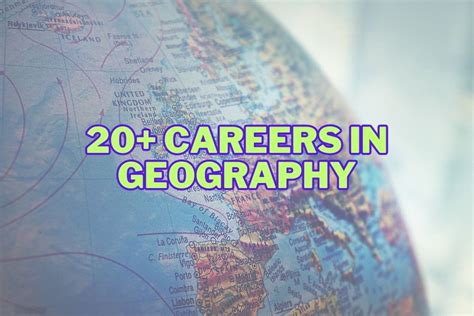Human geography is the study of the relationship between humans and their environment. It encompasses a wide range of topics, from population distribution and demographics to urban planning and environmental sustainability.

With a degree in human geography, you’ll be equipped with the knowledge and skills to address some of the world’s most pressing challenges, such as climate change, urbanization, and inequality. Here are just a few of the career paths you could pursue:
Urban Planner
What They Do: Urban planners design and develop land use plans for cities and towns. They work with a variety of stakeholders, including residents, businesses, and government agencies, to create spaces that are livable, sustainable, and inclusive.
Why It Matters: Urban planning is essential for improving the quality of life in our communities. By creating well-planned cities, we can reduce traffic congestion, improve air quality, and create more affordable housing.
Benefits: Urban planners have a great degree of autonomy and can work on projects that have a direct impact on their community. They also earn a comfortable salary, with a median annual wage of $80,000.
Demographer
What They Do: Demographers study population trends and patterns. They collect and analyze data on birth rates, death rates, migration, and other factors to understand how populations change over time.
Why It Matters: Demography is essential for planning for the future. By understanding population trends, we can better anticipate the need for schools, hospitals, and other services.
Benefits: Demographers often work in academia or government, where they have the opportunity to conduct research and publish their findings. They also contribute to public policy, providing evidence-based recommendations to lawmakers and policymakers.
Environmental Scientist
What They Do: Environmental scientists study the impact of human activities on the environment. They conduct research, monitor pollution levels, and develop strategies to protect and restore ecosystems.
Why It Matters: Environmental science is essential for protecting our planet and ensuring a sustainable future. By understanding the impact of human activities, we can develop policies and technologies to minimize our environmental footprint.
Benefits: Environmental scientists have a wide range of career options, including research, consulting, and government. They also earn a competitive salary, with a median annual wage of $90,000.
GIS Analyst
What They Do: GIS analysts use geographic information systems (GIS) software to create maps and analyze spatial data. They use GIS to solve problems such as crime mapping, land use planning, and environmental monitoring.
Why It Matters: GIS is a powerful tool for understanding the world around us. By overlaying different layers of data, GIS analysts can identify patterns and trends that would be impossible to see otherwise.
Benefits: GIS analysts are in high demand in a variety of industries, including government, business, and non-profits. They also earn a good salary, with a median annual wage of $75,000.
Table 1: Human Geography Careers at a Glance
| Career | Median Annual Wage | Job Outlook |
|---|---|---|
| Urban Planner | $80,000 | 11% growth expected from 2020 to 2030 |
| Demographer | $85,000 | 7% growth expected from 2020 to 2030 |
| Environmental Scientist | $90,000 | 8% growth expected from 2020 to 2030 |
| GIS Analyst | $75,000 | 15% growth expected from 2020 to 2030 |
Table 2: Pros and Cons of Human Geography Careers
| Career | Pros | Cons |
|---|---|---|
| Urban Planner | High degree of autonomy, direct impact on community | Long hours, can be stressful |
| Demographer | Opportunity to conduct research and publish findings, contribute to public policy | Can be data-heavy, requires strong analytical skills |
| Environmental Scientist | Protect the planet and ensure a sustainable future, competitive salary | Can be field-based, requires strong science background |
| GIS Analyst | High demand, good salary | Requires technical skills, can be repetitive |
Table 3: Skills for Success in Human Geography Careers
| Skill | Description |
|---|---|
| Analytical thinking | The ability to analyze data and identify patterns and trends |
| Problem-solving | The ability to solve problems creatively and efficiently |
| Communication | The ability to communicate complex ideas clearly and effectively |
| Teamwork | The ability to work well with others and collaborate on projects |
| Computer literacy | Proficiency in using GIS software and other computer applications |
Table 4: Applications of Human Geography
| Application | Description |
|---|---|
| Climate change adaptation | Planning for the impacts of climate change on human populations and the environment |
| Sustainable development | Promoting economic development while protecting the environment and social equity |
| Disaster preparedness | Preparing for and responding to natural disasters |
| Public health | Improving the health of populations by addressing environmental and social factors |
Human geography is a fascinating and rewarding field that offers a wide range of career opportunities. With a degree in human geography, you’ll be equipped with the knowledge and skills to make a difference in the world.
